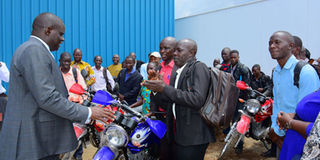Shs5.7b equipment to enhance coffee production

Mr Nkandu hands over one of the motorcycles to a coffee farmers’ group in Namanve, Mukono District. PHOTO BY JOSEPH KIGGUNDU
Kampala. Government and other stakeholders must invest in both short and long-term initiatives if Uganda is to realise its potential in the coffee sub sector, the National Union of Coffee Agribusinesses and Farm Enterprises (Nucafe), has said.
Speaking at the handover of equipment worth Shs5.7b donated by the Agribusiness Initiative Trust (aBi) and the Technical Centre for Agricultural and Rural Cooperation in Namanve, Mukono District, Mr Joseph Nkandu, the Nucafe executive director, said stakeholders must invest in the coffee sub-sector to realise sustainable income growth and crop continuity.
“We must work together and seek interventions where possible to create business [coffee production] continuity. We must all seek ways through which we can help to grow the coffee sub-sector into a sustainable business,” he told farmers who had turned up for a stakeholders training.
Uganda, under the National Coffee Policy, is seeking to enhance coffee production, exporting at least 20 million bags by 2020 from the current 4.5 million bags.
Coffee remains one of the most important agricultural commodities and the major foreign exchange earner, contributing an annual average of 20 per cent of Uganda’s total export revenue.
The equipment among which included two trucks, motorcycles, scale metres, laptop computers furniture and moisture metres will seek to enhance production and quality of speciality eco-friendly coffee as well as boosting incomes of more than 25,000 small scale coffee farmers.
The coffee subsector provides an income to at least 1.5 million households. The crop is mainly grown in central and parts of eastern Uganda.
Nucafe, according the Mr Nkandu is currently implementing a five-year activity plan that seeks to reach out to more than 50,000 farmers across coffee growing regions with the view of building capacity for farmers to effectively implement good agricultural practises and climate smart agriculture for resilience in coffee farming.


